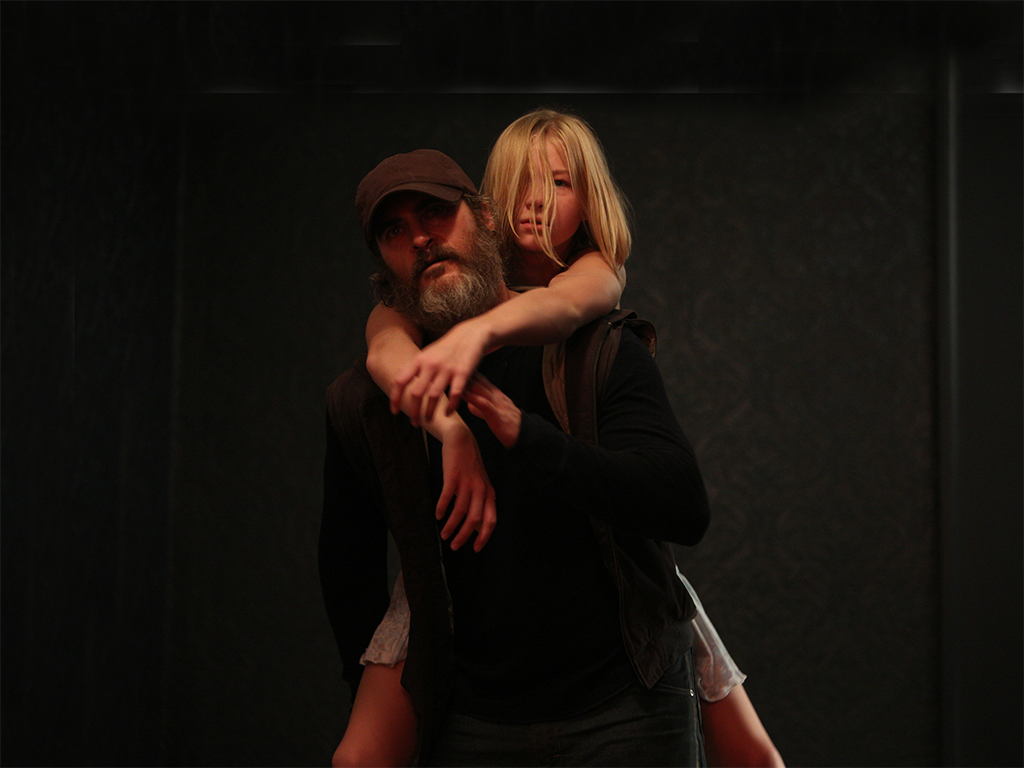Vibe:
This film is a beautiful, strange, horrible, wonderful nightmare .. like after a night of drinking in college when you wake up, remember fragments of the night, and have to piece together your actions. Sometimes it's slow and languid, like when Joe stuffs his pockets with rocks and sinks to the bottom of the lake, and other times it's a rage blackout. It's unpredictable, relentless, and fierce, but also sad.
This film is a visual representation of depression (and PTSD), of what it's like to feel as if you don't matter - not to anyone else and certainly not to yourself.
My days are lackluster, packed with all the mundanity and not enough joy, but sometimes there's a spark of excitement and all the fucks come rushing back to me. I have something to live for again, something meaningful. But what if it's all an illusion? What if I'm just projecting?
Am I a good person or a bad one? I try to be good, but I certainly have some disreputable characteristics. I make questionable choices. I lash out at people who matter to me and sometimes say and do things just to be hurtful. I understand Joe and I think I understand this movie. It's not exactly enjoyable to watch and it might keep you up with questions about your own mental fragility, but it's worthwhile.
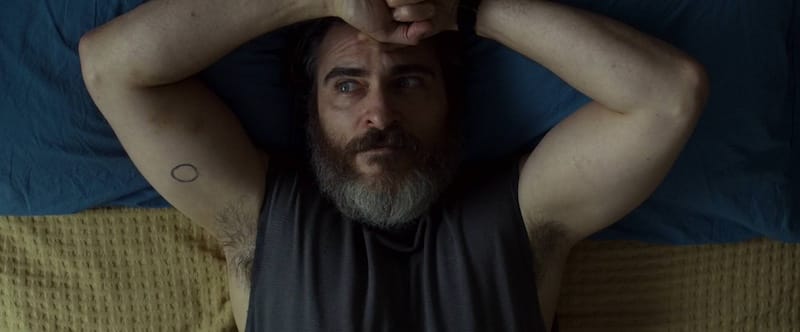
Best time to watch:
Go see this movie when you wake up on a rainy Thursday morning and don't feel like going to work. Take a sick day and hit up your local cinema for an afternoon showing. Stuff your pockets with loose Sour Patch Kids and Raisinets, grab an umbrella, and prepare for a day of dank melancholia. If possible, walk back from the movie in the rain and listen to Jonny Greenwood's soundtrack on Spotify while smoking a joint.
Worst time to watch:
I probably wouldn't watch this after a bad day at work or on a sunny weekend after a few too many drinks at brunch. It does not pair well with mimosas. Like all of Lynne Ramsay's movies, it is fucking depressing and brutal. Mentally prepare to be torn to shreds before watching or you will regret it.
I feel like everything I watch these days is amazing, but also intense and devastating. I just finished the new "Handmaid's Tale" (Season 2, Episode 3) and can't sleep because I'm riddled with anxiety. Then of course, since I can't sleep, I end up falling into a pit of despair, aka Donald Trump tweets and articles about the new Iowa abortion legislation.
Do you now understand why I waste so much time on the "Gilmore Girls" recaps? Sure, everyone in the Stars Hollow universe is a moron and yes, "GG" is garbage compared to prestige TV but goddammit, those basic bitches comfort me. In a world that is so uncertain and fucked up, they are dependable. If you're not in the mood for something heavy, turn on mindless/fun nothingness and don't let yourself feel bad about it. Go ahead and watch "Sabrina the Teenage Witch" for 10 hours in bed on a Saturday ... I won't ever judge you. Life is hard and you deserve any peace you can find.
Where to watch:
"You Were Never Really Here" is streaming on Amazon Prime and available for rental on all the typical platforms.
Quick summary:
If I watched the trailer and wasn't familiar with Lynne Ramsay, I would probably think that this is the indie version of one of those shitty "Taken" movies. Thankfully, it is not. On the surface, it's about a guy named Joe (Joaquin Phoenix) who tries to come to terms with his fucked up past while working as a contract killer. When one of his jobs requires him to rescue an important politician's daughter from a sex trafficking ring, shit hits the fan. The screenplay is an adaptation of Jonathan Ames's 2013 novella by the same name.
Thoughts:
I saw this movie weeks ago but have delayed writing about it because I felt like I couldn't do it justice. I also wasn't sure exactly how I felt or what I wanted to say. Immediately after it ended, my gut reaction was that I enjoyed the film tremendously, but wanted it to be more minimalistic. I thought some of the flashbacks to Joe's past were too explicit and felt heavy-handed. The loose government conspiracy backstory behind Nina's (Ekaterina Samsonov) kidnapping felt likewise unnecessary.
On second watch, they didn't bother me as much and I began to understand their utility.
The whole film is about violence and trauma. How do we break cycles of systemic violence that seem neverending? If I deal with my pain by causing someone else pain, how will it ever dissipate? When asked about Joe's multiple traumas in an an interview with GQ, Ramsay says,
We show you in the film that he's got all these scars on his body, overlapping with one another. We needed to do the same thing with his mind. The fact he just can't take much more, you know what I mean? And the fact that also violence becomes violence becomes violence—it never really ends. That's really the sad journey of the whole film.
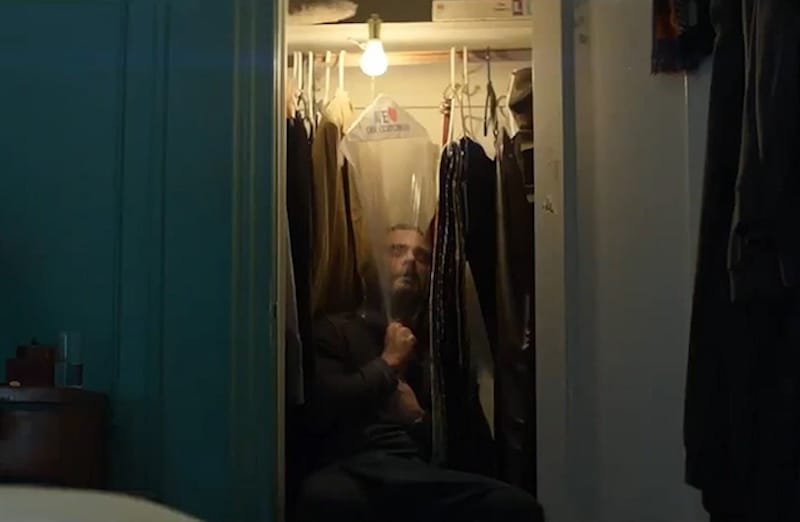
Joe has experienced so much awful shit in his life that he can't contain it any longer. Even in calm moments, when he's taking care of his mom or riding in the back of a cab, he never seems at peace. Similar to Joe, the viewer is in a constant state of unease. Nothing gold can stay and awfulness is always lurking right around the corner. Joe has been pushed to the limit, past the point where he's able to compartmentalize. Ramsay's flashbacks, along with many other visual cues, help make his mental state evident.
Joe is a fascinating character because he's morally ambiguous. Yes, he kills people, but as far as we know, they're people who deserve to be killed. Does this make their deaths justifiable? Does Joe's trauma make his job as a contract killer more acceptable or explainable? If we didn't have any details about his past, would we feel differently about his career choice?
It's notable, too, that none of the violence in this film feels cathartic. I was never rooting for Joe to kill anyone, even Nina's captors. Action happens in bursts and we're never forced to deal with the ramifications. What happens to all of the dead bodies? How does Joe avoid getting caught by the police? We don't know. This movie isn't about any of that. It hones in on the mental, not the physical. Every visual Ramsay creates is part of Joe's world ... It's like we're inside of his mind, watching him as he sees himself. What he sees isn't anything like the reality we understand.
Joe isn't a person who lives in the world as we know it; he exists in his own private hell. He alternates between trying to find his way back to normalcy and contemplating his final escape. He has no purpose and no emotional stakes, but he tries and fails to create them.
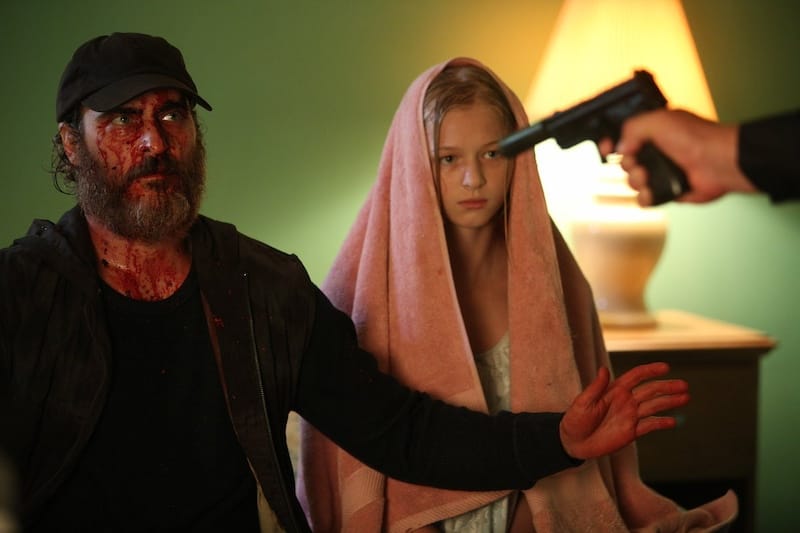
The whole situation with Nina, her father, and the child sex trafficking ring is a red herring of sorts. After Joe initially rescues Nina and they hear about her father's suicide, crooked cops storm the hotel room and take her by force. Suddenly, Joe has a clear purpose, a mission that he must accomplish. The girl is counting on him and he needs to save her.
Even after he returns to the city to find everyone he knows dead, the thought of Nina prevents him from sinking to the bottom of the lake with his mother's corpse. It's all about Nina now; he must survive for her sake.
Nina doesn't need him, though. When he finally tracks her down at the governor's creepy (but also huge and perfectly draped in ivy) mansion, Nina has already taken care of business. The governor's throat has been slit with a switchblade and Nina is downstairs eating dinner, paying no mind to the blood on her fingers and plate.
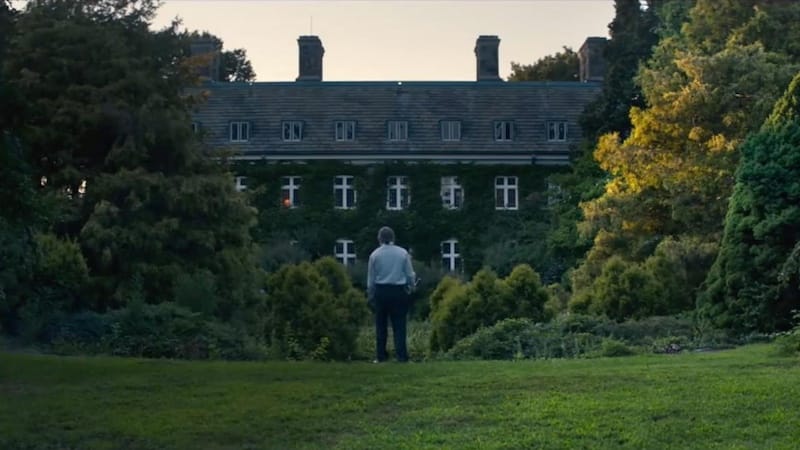
Living for another person is pointless. If you can't live for yourself and your own ideas, then you have nothing to live for. Nina's happy to see Joe, but she doesn't need him. She has the capacity, even after a hellish experience, to comfort him, to tell him that everything will be okay and that they should leave the diner because "it's a beautiful day." Nina hasn't reached her breaking point. She hasn't experienced a lifetime of nonstop violence like Joe has.
There's a Gilles Deleuze quote that I love from a 1987 conference where he talks about cinema and the creative act:
The dream of those who are dreaming concerns those who are not dreaming. Why does it concern them? Because as soon as someone else dreams, there is danger. People's dreams are always all-consuming and threaten to devour us. What other people dream is very dangerous. Dreams are a terrifying will to power. Each of us is more or less a victim of other people's dreams. Even the most graceful young woman is a horrific ravager, not because of her soul, but because of her dreams. Beware of the dreams of others, because if you are caught in their dream, you are done for.
Joe is trapped in the dream of the man as protector/savior, a dream that the cinema itself often touts. He believes that as long as he rescues Nina, his life has meaning. But he doesn't rescue her; she rescues herself. Joe became wrapped up in this fantasy and even used it as motivation to stay alive, but it never came to fruition. Is he fucked? Or is there some way for him to move forward? We don't know. Unlike a typical genre film, Ramsay doesn't wrap everything up for us in a neat bow. She leaves us to struggle with Joe, to grasp at straws for meaning and the will to move forward.
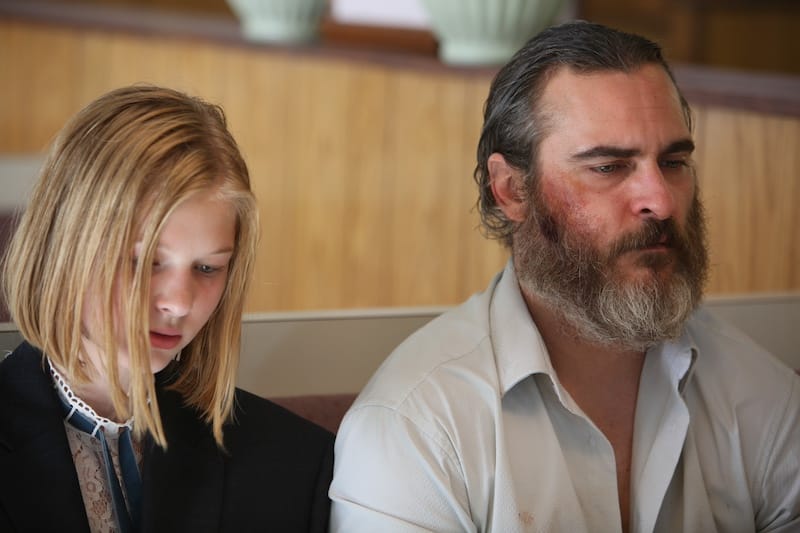
Stray observations:
- I could watch an entire movie about Joe and his mom. Their scenes were some of the film's most beautiful/meaningful.
- Like Joe, I enjoy smashing jelly beans before I eat them.
- It's very fitting that Joe purchases a ball-peen hammer that is made in the USA. There's nothing quite like moral capitalism.
- A few images that stuck with me: feet enclosed in white lace stockings, glasses with one shattered lens (how "Breathless"), and forks flying off of a table.
- I want Morvern Callar to adopt Nina. I think Morvern is the right kind of role model for a fucked up little badass like Nina.
- I love Jonny Greenwood and think he absolutely should have won an Oscar for "Phantom Thread."
- I hope it doesn't take Ramsay another 6-7 years to make her next movie. I can't wait that long!
- Joaquin Phoenix, Judith Roberts, and Ekaterina Samsonov are all fantastic. After I watched this movie, I fell into a hole of Phoenix interviews and was reminded how much I like that bitter, surly, killjoy. Joaquin 4 ever.

